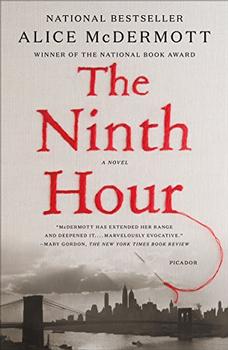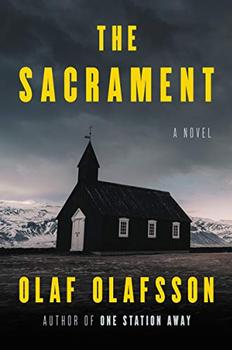Summary | Excerpt | Reading Guide | Discuss | Reviews | Beyond the book | Read-Alikes | Genres & Themes | Author Bio

A Novel
by Alice McDermottIn a pivotal scene in The Ninth Hour, young Sally encounters an increasingly loathsome series of degenerates on an ill-fated train ride across the country. She is beset on all sides by horrors: "Pale, sleeping faces with gaping, distorted mouths, sprawled limbs, a hollow-eyed soldier...a yellow-skinned man folding into himself, gazing forward with a murderous look. A young woman in a jaunty hat, chewing gum ferociously, reading a magazine, picking her nose." The protagonist is traveling from New York to Chicago to join a convent, but is suddenly faced with an existential crisis: Is this the humanity to whom she's meant to devote herself? This theme, of religion as a necessary balm in a world plagued by pain and misery, resonates throughout Alice McDermott's new novel.
In early twentieth century Brooklyn, Sally's mother is employed in the laundry for the Little Nursing Sisters of the Poor (see Beyond the Book). The little girl grows up to idolize the Sisters and, believing it is kismet, travels to Chicago with a letter of introduction to a convent there, but fate intercedes again. When Sally returns home, she is shocked to find her mother involved with a married man, much to the consternation of the bevy of nuns. Meanwhile, on the periphery, we are given glimpses of Sally's future husband, as the two build a friendship over the years.
One of her grown children, speaking from the future, narrates the novel. This allows the story to stretch over several decades, and for McDermott to provide rich characterization, particularly of the nuns. There is Sister Jeanne, who, in the beginning, is a young idealist. She "felt the breath of God warm on her neck," and is a friend to young Sally, explaining complex moral concepts to her. She points out that a child who is denied candy will say that the action is not fair. If even children know what "fair" means, that knowledge must have been given by God at birth. He wants us to know that heaven is our reward for enduring the injustices that are part of life on Earth. Life may not seem fair, but the afterlife will make it so. By the end though, Sister Jeanne is an old woman, certain she has lost God's grace.
Then there is Sister Lucy, a cranky curmudgeon with a dark back story that convinced her, "a woman's life is a blood sacrifice." Potent descriptions effectively demonstrate the power of the seemingly quotidian. "A half piece of bread, well bitten and stained with dark gravy. A glass of tea on the edge of a folded newspaper," these are details of a person's evening meal interrupted by a tragic event. A building in which a fire has recently been extinguished has a "smell of doused peat, of damp stone and swollen wood. Fire, shipwreck, the turned earth of graveyards." While some readers may find the graphic descriptions of the corporeal reality faced by the Nursing Sisters gratuitous, it is an effective means of drawing attention to their mission, which is ministering to God's children, body and soul.
McDermott, a National Book Award winner, excels at the quietly potent story where small moments build into something greater. The Ninth Hour is a novel about grace, family, sacrifice, and duty, how some serve God by serving other people, and how the idea of transcendence makes the earthly world bearable.
![]() This review was originally published in The BookBrowse Review in September 2017, and has been updated for the
September 2018 edition.
Click here to go to this issue.
This review was originally published in The BookBrowse Review in September 2017, and has been updated for the
September 2018 edition.
Click here to go to this issue.

If you liked The Ninth Hour, try these:

by Alice McDermott
Published 2024
A riveting account of women's lives on the margins of the Vietnam War, from the renowned winner of the National Book Award.

by Olaf Olafsson
Published 2020
The haunting, vivid story of a nun whose past returns to her in unexpected ways, all while investigating a mysterious death and a series of harrowing abuse claims.
On the whole, human beings want to be good, but not too good and not quite all the time
Click Here to find out who said this, as well as discovering other famous literary quotes!
Your guide toexceptional books
BookBrowse seeks out and recommends the best in contemporary fiction and nonfiction—books that not only engage and entertain but also deepen our understanding of ourselves and the world around us.